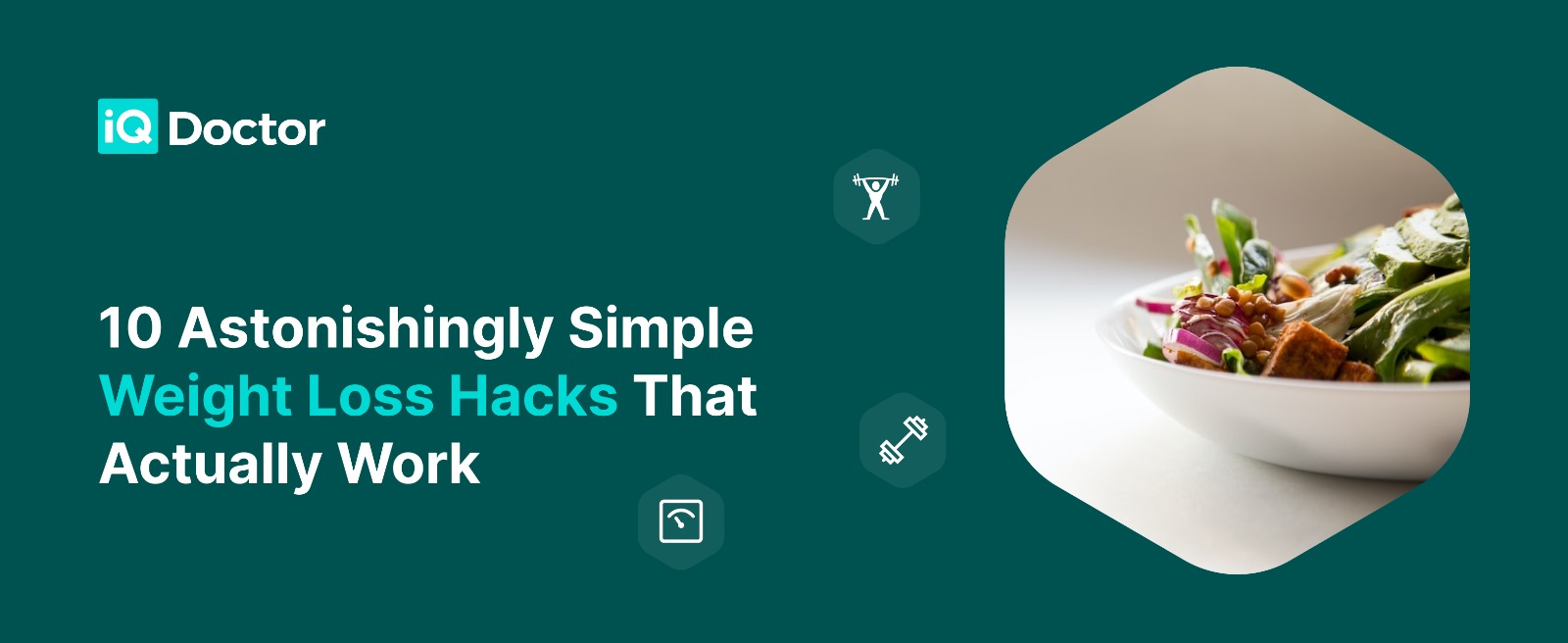10 Astonishingly Simple Weight Loss Hacks That Actually Work
08 June, 2023 | Jane Thomas - Marketing

While weight loss is a complex process that requires a combination of healthy eating, regular physical activity, and lifestyle changes, here are ten simple weight loss hacks that can support your efforts
Stay hydrated
Drinking an adequate amount of water can help you feel full, reduce calorie intake, and boost metabolism. Aim for at least 8 cups (use L or mL) of water per day.
Mindful eating
Pay attention to your body's hunger and fullness cues. Eat slowly, savoring each bite, and avoid distractions like TV or screens while eating. This can help prevent overeating.
Mindful eating is a practice that involves paying full attention to the experience of eating, without judgment or distraction. It focuses on bringing awareness to the entire process of eating, including the physical sensations, thoughts, and emotions associated with food.
Portion control
Use smaller plates and bowls to trick your brain into thinking you're eating more. Be mindful of portion sizes and try not to go for second helpings unless you're genuinely hungry.
Eat more fiber: Foods rich in fiber, such as fruits, vegetables, whole grains, and legumes, can help you feel full for longer periods and reduce overall calorie intake.
Choose whole, unprocessed foods
Focus on incorporating whole foods into your diet, such as lean proteins, fruits, vegetables, nuts, and seeds. These foods are generally more nutrient-dense and lower in calories compared to processed foods.
Plan and prepare meals: Planning your meals in advance can help you make healthier choices and avoid impulsive, unhealthy options. Batch cooking and meal prepping can save time and make nutritious eating more convenient.
Weight loss Medications
Weight loss medications, also known as anti-obesity medications or diet pills, can be prescribed by healthcare professionals to aid in weight loss efforts.
It's important to note that weight loss medications are not a substitute for healthy eating and physical activity but are meant to be used as part of a comprehensive weight management plan. Here are some commonly prescribed weight loss medications
Orlistat:
Orlistat works by blocking the absorption of dietary fat in the intestines. This results in the excretion of about 30% of dietary fat in the stool, which reduces overall calorie intake. Orlistat is best suited for individuals who have a BMI (body mass index) of 30 or higher, or those with a BMI of 27 or higher with other weight-related health conditions such as type 2 diabetes or high blood pressure.
Saxenda
Saxenda is a brand name for the weight loss medication liraglutide. Liraglutide is a glucagon-like peptide-1 (GLP-1) receptor agonist that works by slowing down stomach emptying, increasing feelings of fullness, and reducing appetite.
Get active
Regular physical activity is crucial for weight loss. Find activities you enjoy and make them a part of your routine. Aim for a combination of cardiovascular exercises, strength training, not necessary. Remember to get active or to start gradually and listen to your body. It's important to choose activities that you enjoy so that you can sustain your active lifestyle in the long run. Stay motivated, set realistic goals, and make physical activity a regular part of your routine
Limit sugary drinksLimiting your intake of sugary drinks is a healthy choice that can have numerous benefits for your overall well-being. Here are some tips to help you reduce your consumption of sugary beverages:
Choose water Water is the best and healthiest choice for hydration. It has no added sugars, no calories, and helps to quench your thirst. Make it a habit to reach for a glass of water whenever you're thirsty.
Opt for unsweetened beverages Instead of sugary drinks like sodas, fruit juices, sports drinks, and sweetened teas, choose unsweetened options. Look for drinks labeled as "unsweetened," "sugar-free," or "no added sugars."
Infuse flavor into water If you find plain water boring, add some natural flavor by infusing it with slices of lemon, lime, cucumber, or berries. You can also try herbal teas or infusions for a refreshing and flavorful alternative.
Gradually reduce consumption If you're used to drinking sugary beverages regularly, try gradually reducing your intake. Start by cutting back on one sugary drink per day and replacing it with a healthier option. Over time, continue to decrease your consumption until you've eliminated or significantly reduced sugary drinks from your routine.
Be mindful of portion sizes Even seemingly healthy beverages like fruit juices can contain high amounts of sugar. If you do choose to drink fruit juice, do so in moderation and stick to small portions. Consider diluting fruit juices with water to reduce the overall sugar content.
Read labels Pay attention to the nutrition labels when purchasing beverages. Check the sugar content and choose options with the lowest amount of added sugars. Be aware that sugar can be listed under various names, such as sucrose, high fructose corn syrup, or cane sugar.
Make homemade alternatives Consider making your own refreshing drinks at home. You can experiment with infused waters, herbal teas, or homemade fruit smoothies using fresh fruits and vegetables. This way, you have control over the ingredients and can avoid added sugars.
Reducing your consumption of sugary drinks is a positive step toward improving your health. By choosing healthier alternatives and staying mindful of your choices, you can make a significant impact on your overall sugar intake and well-being.
Prioritize sleep: Sufficient sleep is essential for weight management. Lack of sleep can disrupt hunger and fullness hormones, leading to increased cravings and overeating. Aim for 7-9 hours of quality sleep each night.
Practice stress management: Chronic stress can contribute to weight gain. Find healthy ways to manage stress, such as exercise, meditation, deep breathing, or engaging in hobbies you enjoy.
Remember, sustainable weight loss is a gradual process. It's important to focus on making long-term lifestyle changes rather than relying on quick fixes or drastic measures. Consulting with a healthcare professional or registered dietitian can provide personalized guidance based on your specific needs and goals.
Reviewed By

Omar El-Gohary
The superintendent and lead pharmacist - registration number 2059792.
Omar is passionate about developing healthcare technology to empower our patients.


